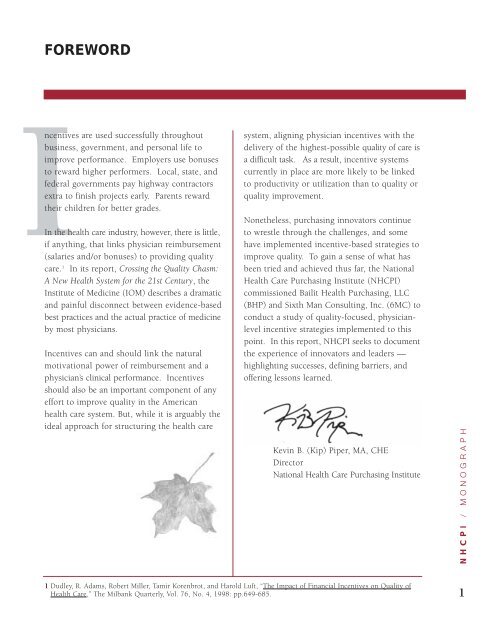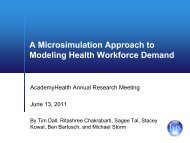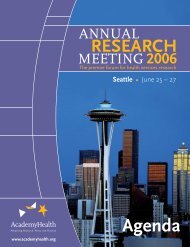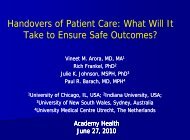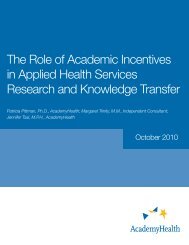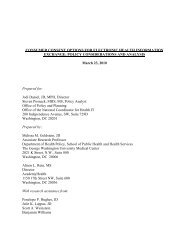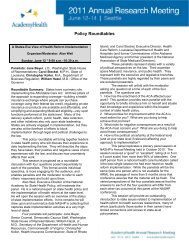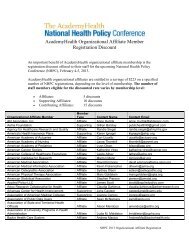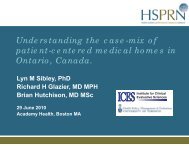The Growing Case for Using Physician Incentives to - AcademyHealth
The Growing Case for Using Physician Incentives to - AcademyHealth
The Growing Case for Using Physician Incentives to - AcademyHealth
You also want an ePaper? Increase the reach of your titles
YUMPU automatically turns print PDFs into web optimized ePapers that Google loves.
FOREWORD<br />
I(salaries and/or bonuses) <strong>to</strong> providing quality<br />
ncentives are used successfully throughout<br />
business, government, and personal life <strong>to</strong><br />
improve per<strong>for</strong>mance. Employers use bonuses<br />
<strong>to</strong> reward higher per<strong>for</strong>mers. Local, state, and<br />
federal governments pay highway contrac<strong>to</strong>rs<br />
extra <strong>to</strong> finish projects early. Parents reward<br />
their children <strong>for</strong> better grades.<br />
In the health care industry, however, there is little,<br />
if anything, that links physician reimbursement<br />
care. 1 In its report, Crossing the Quality Chasm:<br />
A New Health System <strong>for</strong> the 21st Century, the<br />
Institute of Medicine (IOM) describes a dramatic<br />
and painful disconnect between evidence-based<br />
best practices and the actual practice of medicine<br />
by most physicians.<br />
<strong>Incentives</strong> can and should link the natural<br />
motivational power of reimbursement and a<br />
physician’s clinical per<strong>for</strong>mance. <strong>Incentives</strong><br />
should also be an important component of any<br />
ef<strong>for</strong>t <strong>to</strong> improve quality in the American<br />
health care system. But, while it is arguably the<br />
ideal approach <strong>for</strong> structuring the health care<br />
system, aligning physician incentives with the<br />
delivery of the highest-possible quality of care is<br />
a difficult task. As a result, incentive systems<br />
currently in place are more likely <strong>to</strong> be linked<br />
<strong>to</strong> productivity or utilization than <strong>to</strong> quality or<br />
quality improvement.<br />
Nonetheless, purchasing innova<strong>to</strong>rs continue<br />
<strong>to</strong> wrestle through the challenges, and some<br />
have implemented incentive-based strategies <strong>to</strong><br />
improve quality. To gain a sense of what has<br />
been tried and achieved thus far, the National<br />
Health Care Purchasing Institute (NHCPI)<br />
commissioned Bailit Health Purchasing, LLC<br />
(BHP) and Sixth Man Consulting, Inc. (6MC) <strong>to</strong><br />
conduct a study of quality-focused, physicianlevel<br />
incentive strategies implemented <strong>to</strong> this<br />
point. In this report, NHCPI seeks <strong>to</strong> document<br />
the experience of innova<strong>to</strong>rs and leaders —<br />
highlighting successes, defining barriers, and<br />
offering lessons learned.<br />
Kevin B. (Kip) Piper, MA, CHE<br />
Direc<strong>to</strong>r<br />
National Health Care Purchasing Institute<br />
NHCPI / MONOGRAPH<br />
1 Dudley, R. Adams, Robert Miller, Tamir Korenbrot, and Harold Luft, “<strong>The</strong> Impact of Financial <strong>Incentives</strong> on Quality of<br />
Health Care,” <strong>The</strong> Milbank Quarterly, Vol. 76, No. 4, 1998: pp.649-685.<br />
1


